Sustainable Mining Camps: Lida Group Delivers High Quality Mobile Houses Using Recycled Sandwich Panel Temporary Structures
2025-Aug-06 15:57:43
By Admin
1. Introduction
The mining industry plays a crucial role in the global economy, providing essential raw materials for various sectors. However, it has long been associated with significant environmental impacts and challenges in terms of infrastructure development, especially in the establishment of mining camps. Traditional mining camps often involve the use of non – sustainable materials, contribute to high carbon emissions, and cause substantial disruption to local ecosystems.
In recent years, there has been a growing global emphasis on sustainability across all industries, and the mining sector is no exception. Stakeholders, including governments, environmental groups, and local communities, are demanding that mining companies adopt more sustainable practices. This includes not only minimizing the environmental footprint during the mining process but also ensuring sustainable living and working conditions for the workforce in mining camps.
Lida Group, a renowned player in the construction and modular housing industry, has emerged as a pioneer in addressing these challenges. By utilizing recycled sandwich panel temporary structures, Lida Group is delivering high – quality mobile houses that are transforming the concept of mining camps. These sustainable solutions are not only environmentally friendly but also offer numerous benefits in terms of cost – effectiveness, durability, and adaptability to the unique requirements of mining operations.
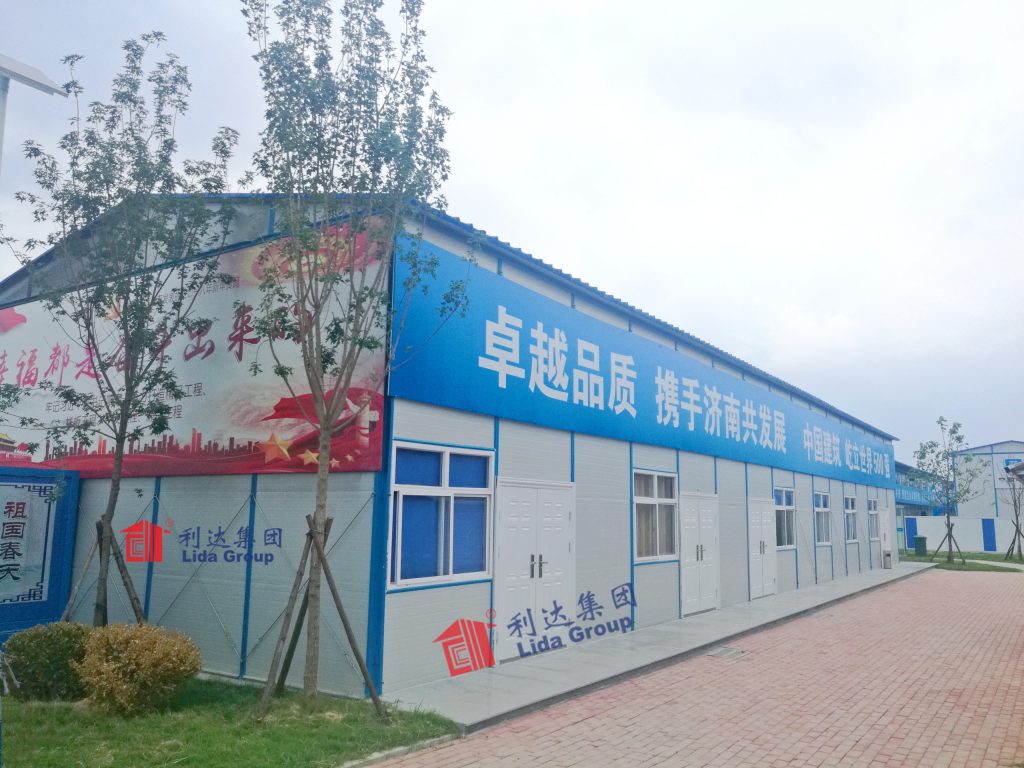
2. The Need for Sustainable Mining Camps
2.1 Environmental Impact of Traditional Mining Camps
Traditional mining camps typically rely on diesel – powered generators for electricity, which are a major source of greenhouse gas emissions. According to the International Council on Mining and Metals (ICMM, 2024), diesel generators account for approximately 28% of mining’s onsite emissions. This not only contributes to global climate change but also has a significant impact on local air quality, affecting the health of both miners and nearby communities.
Moreover, the construction of traditional mining camps often involves the use of non – renewable and non – recycled materials. Buildings are frequently made of virgin steel and concrete, which have a high carbon footprint due to the energy – intensive manufacturing processes. The extraction and transportation of these materials also cause environmental damage, such as deforestation for timber (if used in construction) and disruption of natural habitats.
In addition, traditional mining camps generate a large amount of waste. On average, mining camps produce 3.5 kg of waste per worker daily. This waste includes construction debris, food waste, and discarded equipment, much of which ends up in landfills, further straining the environment.
2.2 Social and Economic Considerations
Sustainable mining camps are also essential from a social and economic perspective. Miners often have to work in remote and harsh environments, and the quality of their living conditions can significantly impact their well – being and productivity. Inadequate housing, lack of proper sanitation, and poor living facilities can lead to increased stress, health problems, and high staff turnover rates.
From an economic standpoint, sustainable mining camps can offer long – term cost savings. By reducing energy consumption, minimizing waste disposal costs, and using recycled materials, mining companies can lower their operational expenses. Additionally, sustainable practices can enhance the reputation of mining companies, which may lead to better relationships with local communities, easier access to financing, and potentially more favorable regulatory treatment.
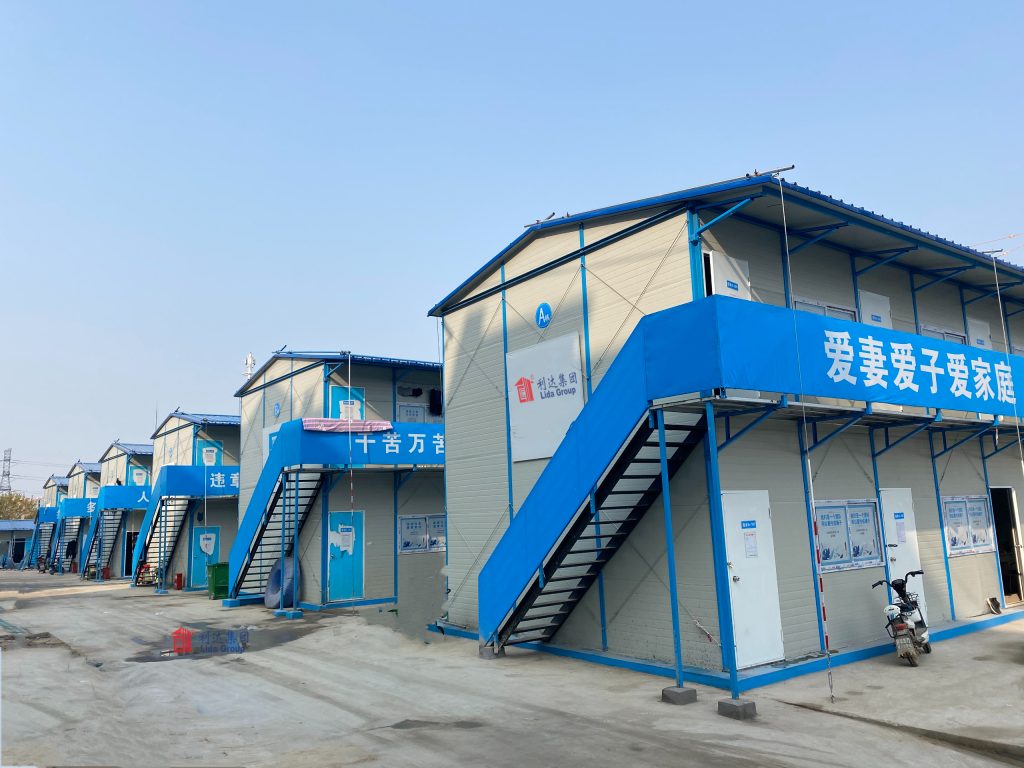
3. Lida Group: An Overview
Lida Group has a long – standing reputation in the construction and modular housing market. Since its establishment, the group has been committed to innovation and sustainability. It has a global presence, with projects spanning across different continents, catering to a wide range of industries, including mining, disaster relief, and temporary accommodation for large – scale events.
The group’s expertise lies in the design, production, and installation of modular housing systems. It has a state – of – the – art manufacturing facility equipped with advanced technology and a team of highly skilled engineers and designers. Lida Group’s commitment to quality is evident in its adherence to international standards and its continuous research and development efforts to improve its products and services.
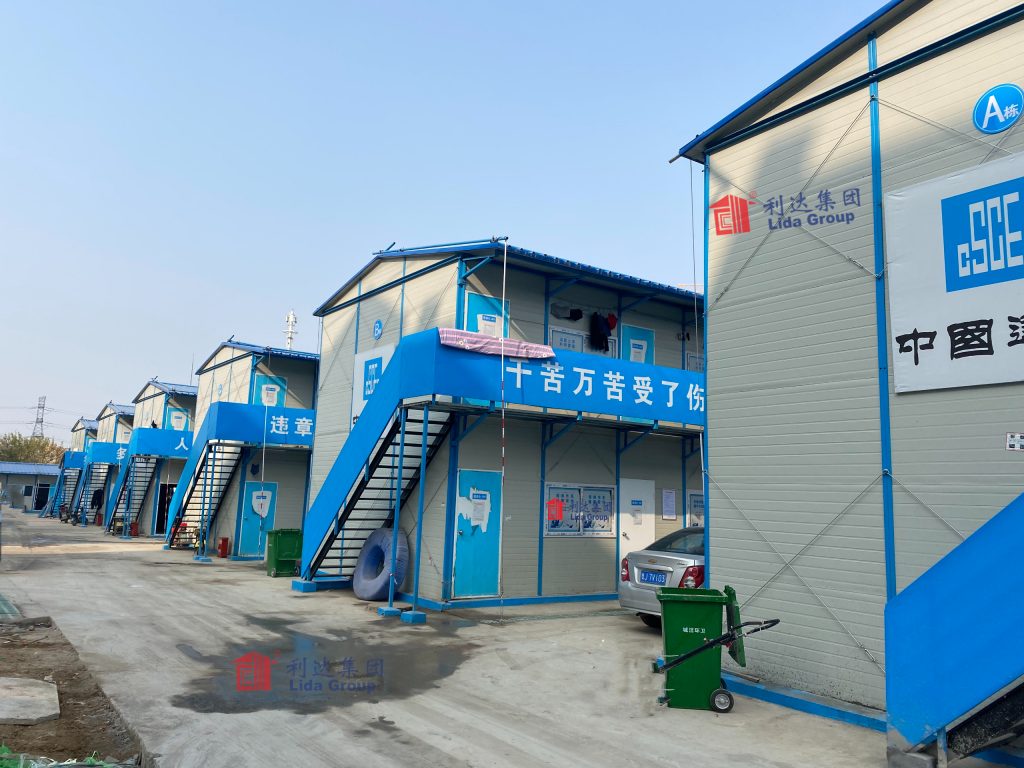
4. Recycled Sandwich Panel Temporary Structures: A Sustainable Solution
4.1 Composition and Characteristics of Recycled Sandwich Panels
Recycled sandwich panels, the core component of Lida Group’s mobile houses, are made from a combination of recycled materials. The outer layers of the panels are typically composed of recycled steel, which is sourced from industrial scrap. Lida Group’s patented Circusteel™ process enables them to achieve a remarkable 98% recycled content in the walls and roofs of their container buildings, compared to only 30% in traditional builds. This high recycled content not only reduces the demand for virgin steel but also diverts a significant amount of steel waste from landfills.
The inner core of the sandwich panels is filled with a lightweight and insulating material. In many cases, Lida Group uses hempcrete, a mix of hemp hurd and lime. Hempcrete has excellent insulating properties, which helps in reducing energy consumption within the mobile houses. It also has a low carbon footprint as hemp is a fast – growing and sustainable crop. Additionally, hempcrete is breathable, which can improve indoor air quality, a crucial factor in the health and comfort of miners.
4.2 Advantages in Environmental Sustainability
4.2.1 Reducing Carbon Emissions
The use of recycled steel in the sandwich panels significantly reduces carbon emissions. According to ISO 14064 – 3 certification, the carbon emissions per ton of recycled steel used by Lida Group are 72% lower compared to virgin steel. By using such recycled materials in their mobile houses, Lida Group is helping mining companies to substantially cut their Scope 3 emissions (indirect emissions from the use of purchased goods and services). For example, in one project, when 200 temporary cabins were replaced with Lida Group container buildings made from site scrap, 8,400 tons of steel were recycled, resulting in a 12% reduction in Scope 3 emissions.
4.2.2 Minimizing Land Disruption
Traditional mines often cause extensive land disruption due to the construction of permanent concrete structures. Lida Group’s modular house systems, based on recycled sandwich panel structures, minimize this disruption. The mobile houses can be easily installed on various terrains with minimal ground preparation. They can be quickly assembled and disassembled, allowing mining companies to adapt to changing mining operations and site requirements. This flexibility means that the land can be more easily restored to its original state once the mining activities in a particular area are completed.
4.2.3 Waste Reduction and Recycling
As mentioned earlier, mining camps generate a significant amount of waste. Lida Group’s mobile houses are designed with waste reduction and recycling in mind. The use of recycled materials in their construction is a form of waste prevention in itself. Additionally, the houses can be integrated with waste management systems such as compost heat recovery. This system captures thermal energy from food scraps, which can reach temperatures of up to 45 °C. By harnessing this energy, mining camps can reduce their reliance on external energy sources for heating and other purposes.
4.3 Cost – Effectiveness and Durability
4.3.1 Cost – Savings in the Long Run
Although the initial investment in Lida Group’s sustainable mobile houses may seem higher compared to some traditional temporary housing options, they offer significant cost savings in the long run. The use of energy – efficient materials, such as the insulating hempcrete core in the sandwich panels, reduces energy consumption for heating and cooling. This leads to lower electricity bills over time.
Moreover, the durability of the recycled sandwich panel structures means that they require less frequent replacement and maintenance. The high – quality recycled steel used in the outer layers is resistant to corrosion and wear, even in harsh mining environments. This reduces the overall lifecycle cost of the housing, making it a more cost – effective option for mining companies in the long term.
4.3.2 Durability in Harsh Mining Environments
Mining environments are often harsh, with extreme temperatures, high humidity, and exposure to dust and chemicals. Lida Group’s mobile houses are designed to withstand these conditions. The recycled sandwich panels are engineered to be robust and durable. The steel outer layers provide excellent protection against physical damage, while the insulating core helps to regulate the internal temperature, ensuring a comfortable living environment for miners regardless of the external conditions.
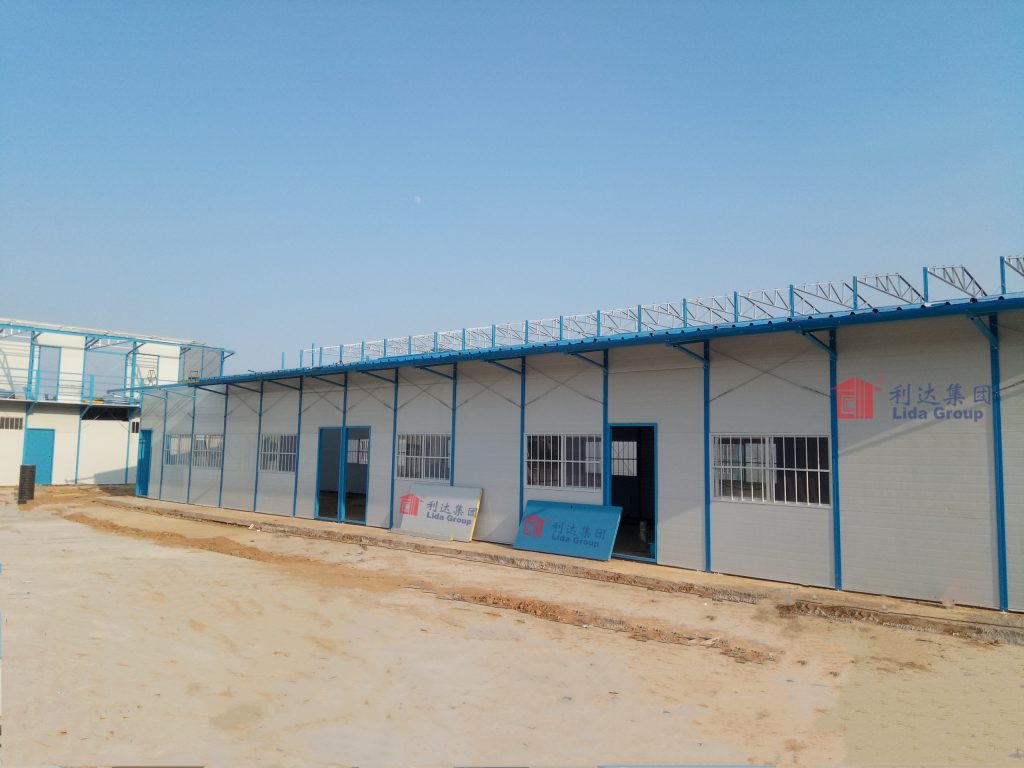
5. Case Studies of Lida Group’s Mining Camp Projects
5.1 Project A: A Large – Scale Copper Mine in South America
In a large – scale copper mine in South America, Lida Group was contracted to provide housing for over 1000 miners. The mine was located in a remote area with challenging terrain and a fragile ecosystem. Lida Group installed 300 mobile houses using recycled sandwich panel temporary structures.
The installation process was completed in a short period, minimizing disruption to the mining operations. The mobile houses were equipped with energy – efficient lighting and heating systems, which were powered by a combination of solar panels and a small – scale wind turbine installed on – site. This significantly reduced the mine’s reliance on diesel generators, leading to a 30% reduction in onsite energy – related emissions.
The use of recycled materials in the construction of the houses was well – received by the local community, as it demonstrated the mine’s commitment to environmental protection. Miners reported improved living conditions, with better insulation keeping their living quarters warm in the cold nights and cool during the hot days. As a result, staff turnover decreased by 15% in the first year after the new housing was provided.
5.2 Project B: A Gold Mine in Africa
A gold mine in Africa faced the challenge of providing housing for a growing workforce while also meeting strict environmental regulations. Lida Group supplied 200 mobile houses for the mine. These houses were designed to be easily expandable as the workforce increased.
The recycled sandwich panel structures were not only sustainable but also cost – effective. The mine was able to save on construction costs as the mobile houses were pre – fabricated and quickly assembled on – site. The waste management systems integrated into the houses, including compost heat recovery, helped to reduce the amount of waste sent to local landfills by 40%.
In addition, the mine used the data collected from the energy – monitoring systems installed in the mobile houses to further optimize energy consumption. This led to a 20% reduction in overall energy usage in the mining camp, resulting in significant cost savings for the mine.
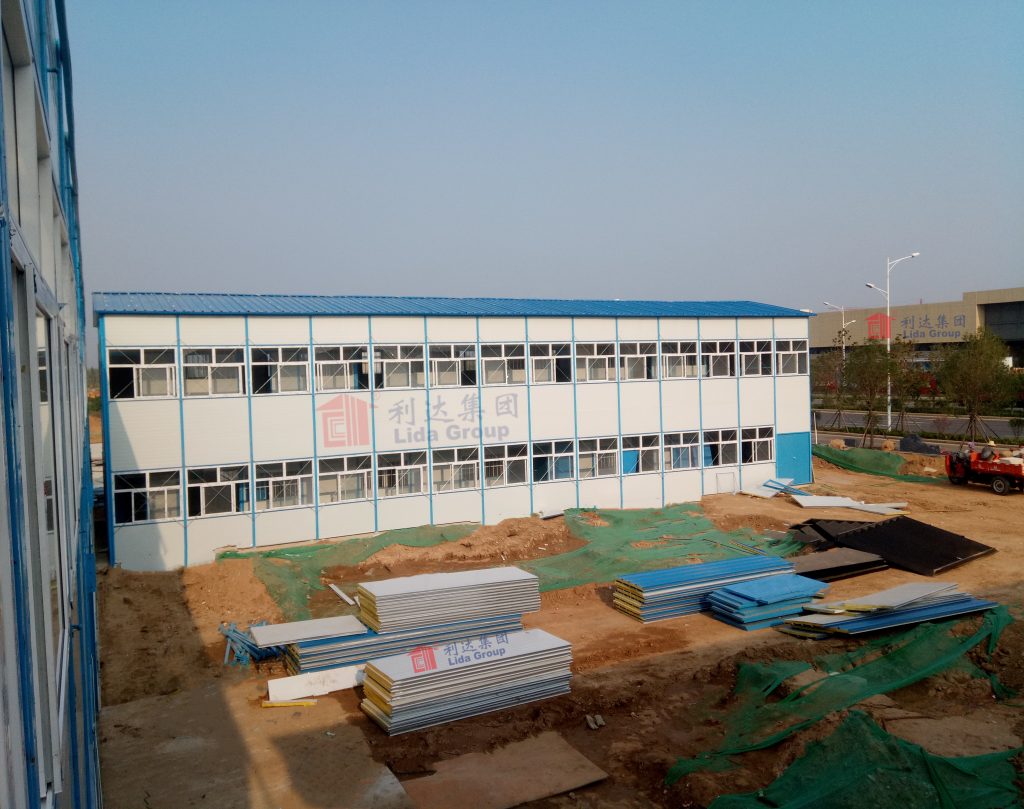
6. Integration with Mining Operations and Community
6.1 Adaptability to Mining Site Requirements
Lida Group’s mobile houses are highly adaptable to the specific requirements of mining sites. They can be customized in terms of size, layout, and functionality. For example, some mobile houses can be designed with additional storage space for mining equipment, while others can be configured as office spaces or communal areas.
The modular nature of the houses allows for easy expansion or contraction of the mining camp as the mining operations progress. If a new area of the mine is opened up and more workers are needed, additional mobile houses can be quickly added to the camp. Conversely, if mining activities in a particular area are completed, the mobile houses can be disassembled and relocated to another part of the mine or even to a different mining site altogether.
6.2 Community Engagement and Social Benefits
Sustainable mining camps, such as those provided by Lida Group, can have positive impacts on local communities. The use of recycled materials and sustainable construction practices shows the mining company’s commitment to environmental stewardship, which can improve the relationship between the mine and the community.
In addition, the high – quality living conditions provided by the mobile houses can attract and retain a skilled workforce. This can lead to more stable employment opportunities for local residents, as mining companies are more likely to hire from the local community when they can offer good living and working conditions. Some mining companies have also used the construction of sustainable mining camps as an opportunity to engage with the community in environmental education programs, further strengthening the bond between the mine and the local population.
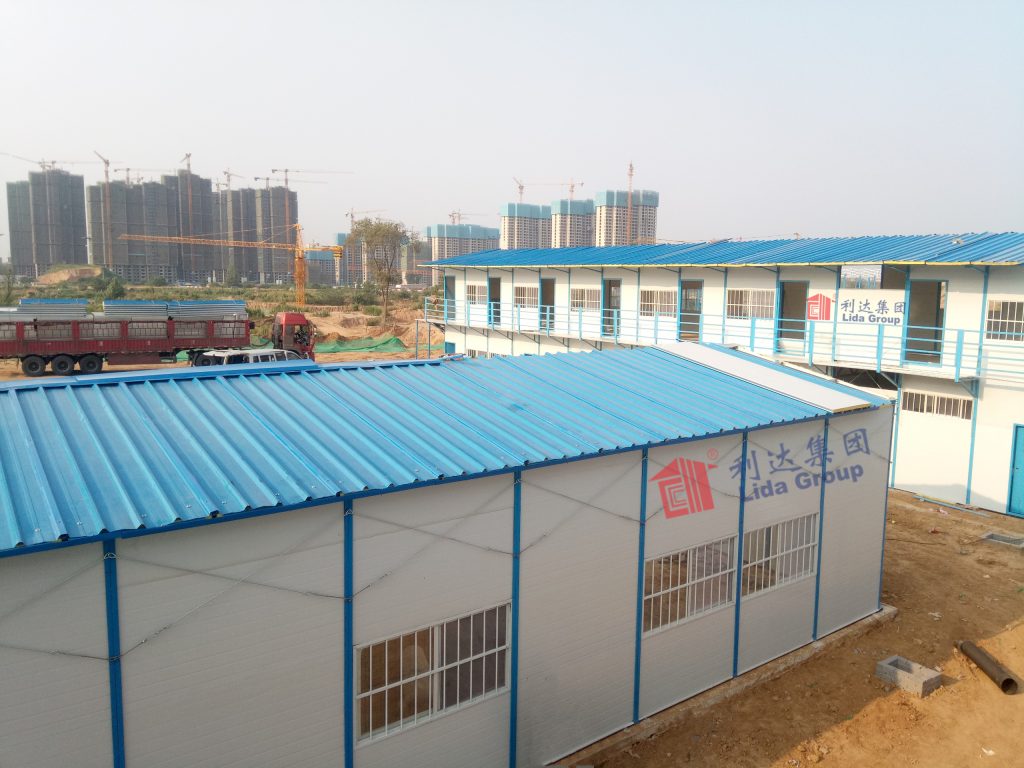
7. Challenges and Future Outlook
7.1 Challenges in Implementing Sustainable Mining Camp Solutions
7.1.1 Initial Investment and Cost Perception
One of the main challenges in implementing sustainable mining camp solutions, such as those offered by Lida Group, is the perception of high initial investment. Some mining companies may be hesitant to invest in more expensive sustainable housing options when cheaper, traditional alternatives are available. However, as discussed earlier, the long – term cost savings in terms of energy consumption, maintenance, and waste management often outweigh the initial investment.
7.1.2 Technical and Logistical Hurdles
The installation and maintenance of sustainable mining camp infrastructure, such as solar panels and waste management systems, require a certain level of technical expertise. Mining companies may need to invest in training their staff or hiring external experts to ensure the proper functioning of these systems. Additionally, logistical challenges, such as the transportation of the pre – fabricated mobile houses to remote mining sites, can also pose difficulties.
7.2 Future Trends and the Role of Lida Group
The future of sustainable mining camps looks promising, with increasing pressure on the mining industry to reduce its environmental impact. Lida Group is well – positioned to play a significant role in this evolving landscape. The company is likely to continue innovating and improving its recycled sandwich panel temporary structures.
For example, Lida Group may develop even more advanced waste management systems integrated into the mobile houses, such as water recycling systems. They may also explore the use of new and more sustainable materials in the construction of their houses. As the demand for sustainable mining camp solutions grows, Lida Group is expected to expand its global reach and partner with more mining companies to create a more sustainable future for the mining industry.
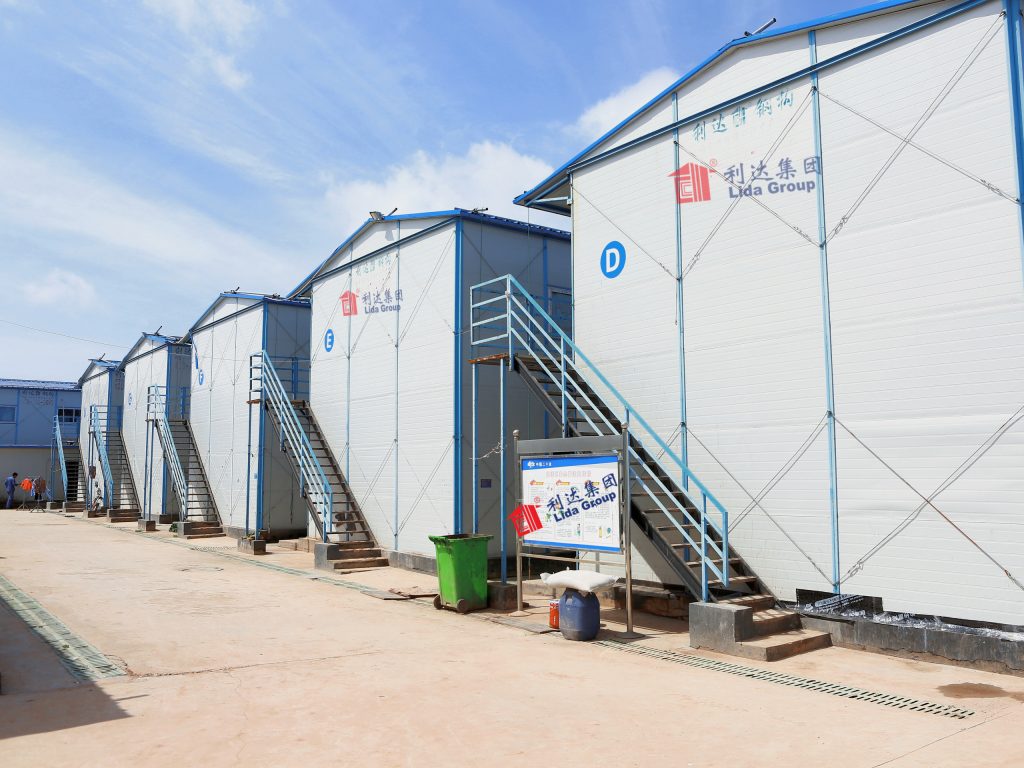
8. Conclusion
The mining industry is at a crossroads, facing increasing pressure to adopt sustainable practices. Sustainable mining camps are not only an environmental imperative but also a key factor in ensuring the long – term success and social acceptance of mining operations. Lida Group’s use of recycled sandwich panel temporary structures to deliver high – quality mobile houses offers a comprehensive and effective solution to the challenges faced by the mining industry in this regard.
Through the use of recycled materials, energy – efficient designs, and waste – reducing features, Lida Group’s mobile houses significantly reduce the environmental footprint of mining camps. They also provide cost – effective and durable housing options that improve the living and working conditions of miners. Case studies have shown that these sustainable solutions can lead to reduced emissions, improved waste management, and enhanced community relations.
Although there are challenges in implementing these solutions, such as initial investment concerns and technical/logistical hurdles, the long – term benefits far outweigh the costs. As the mining industry continues to evolve towards greater sustainability, Lida Group is likely to remain at the forefront, driving innovation and setting new standards for sustainable mining camp infrastructure. By choosing Lida Group’s mobile houses, mining companies can take a significant step towards creating a more sustainable future for themselves, their workers, and the environment.
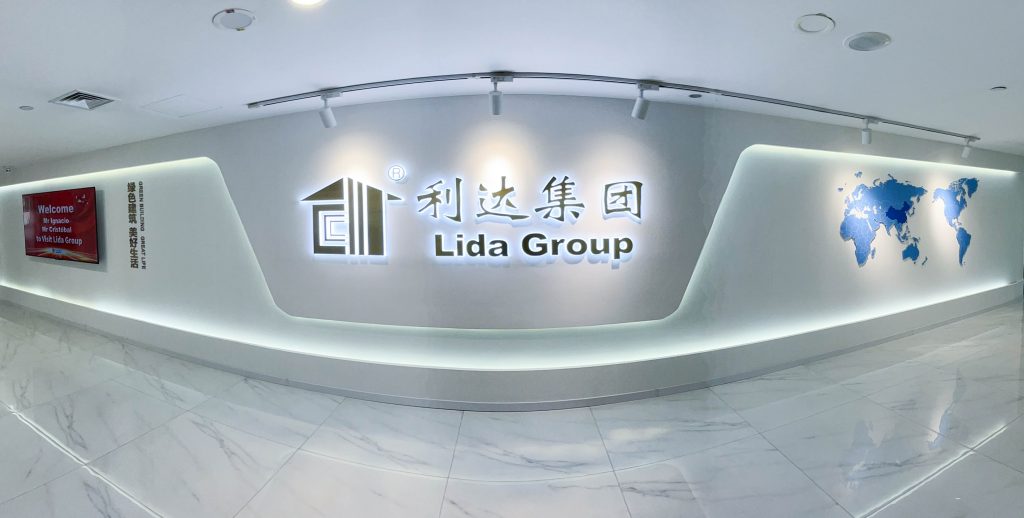
Related news
-
Why Refugee Camps Adopt Lida Group's Durable Temporary Prefab Buildings with High Quality Mobile House Amenities
2025-08-06 11:34:57
-
Hurricane-Proof Shelters: Lida Group's Prefab Sandwich Panel Construction Enables Rapid Deployment of Secure Mobile Units
2025-08-06 14:18:18
-
Film Set Revolution: High Quality Mobile House Villages Deployed via Lida Group's Temporary Prefab Sandwich Panel Systems
2025-08-06 09:58:13
contact us
- Tel: +86-532-88966982
- Whatsapp: +86-13793209022
- E-mail: sales@lidajituan.com


